Removal Procedure
Notice: If the engine is damaged internally and a new engine assembly is installed
in the vehicle, ensure that all foreign material is flushed out of the cooling
system. You must also flush out the oil cooler system. Failure to rid the
oil cooler system of debris can result in engine damage.
Notice: On some vehicles it may be necessary to support the transmission as
the engine is removed to prevent the transmission from falling, causing damage
to the unit.
The procedure required to replace an engine varies according to the optional
equipment and available shop facilities. The following procedure is intended only
as a guide for performing the work. The technician must determine what additional
work is needed.
- Block the wheels.
- If equipped with air brakes, drain the air reservoirs. Refer to
Draining Reservoirs
in Air Brakes.
- Remove the engine cover. Refer to
Engine Cover Replacement
in Interior Trim.
- Disconnect the negative battery cables. Refer to
Battery Negative Cable Disconnection and Connection
in Engine Electrical.
- Remove the air cleaner layer. Refer to
Air Cleaner Replacement
in Engine Controls - 7.8L.
- Remove the cooling layer . Refer to
Cooling Layer Removal
in Engine Cooling.
- If equipped, remove the front modulator valve bracket from the front crossmember.
Refer to
Front Brake Pressure Modulator Valve Replacement
in
Air Antilock Brake System.
- Remove the front radiator crossmember. Refer to
Radiator Crossmember Replacement
in Frame and Underbody.
- Remove the engine front crossmember. Refer to
Engine Front Crossmember Replacement
in Frame and Underbody.
- Remove the air inlet pipes.
- Remove the radiator and heater hoses.
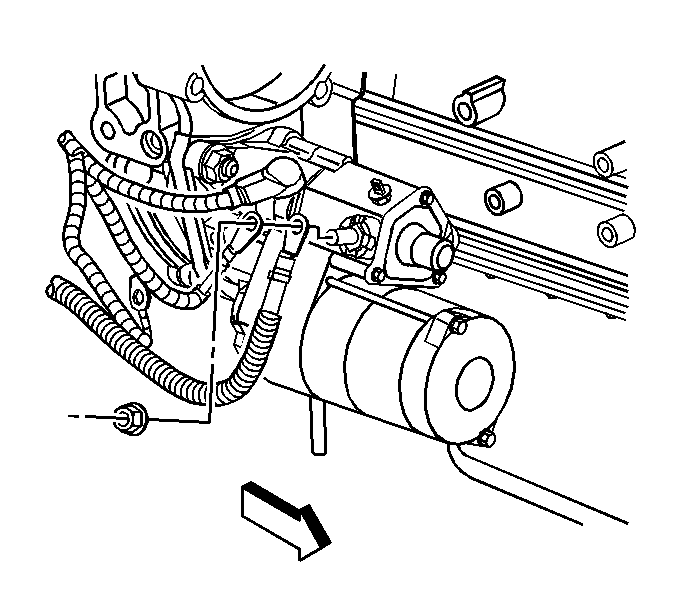
- Remove
the electrical harness from the starter assembly.
- Remove the following engine electrical harness connectors from the electrical
connectors.
| • | The oil pressure sensor |
| • | The generator electrical connectors |
| • | If equipped, the A/C clutch and high pressure switch electrical connectors |
| • | The coolant temperature sensor |
| • | The glow plug electrical connectors |
| • | The oil level electrical connectors |
| • | The fuel filter electrical connectors |
- Remove the engine wire harness retainers and position the engine wire
harness away from the engine.
- Remove all ground straps from the engine to the frame.
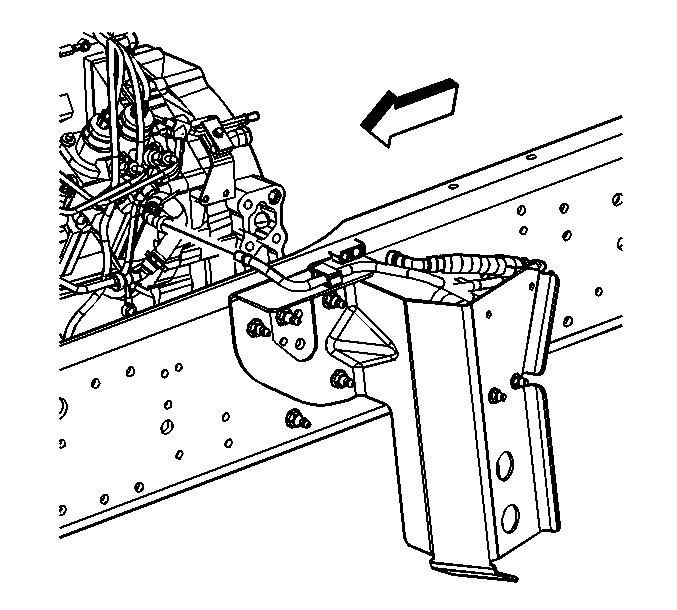
Important: Cap the fuel line and the fittings to prevent
the fuel from leaking and dirt from entering the fuel system.
- Remove the fuel feed lines and return from the fuel supply pump and rear of
engine. Refer to
Fuel Injection Pump Replacement
in
Engine Controls - 7.8L.
- Remove the propeller shaft. Refer to
One-Piece Propeller Shaft Replacement
,
Two-Piece Propeller Shaft Replacement
or
Three-Piece Propeller Shaft Replacement
in Propeller Shaft.

- If equipped, remove the parking brake cable
from the brake drum.
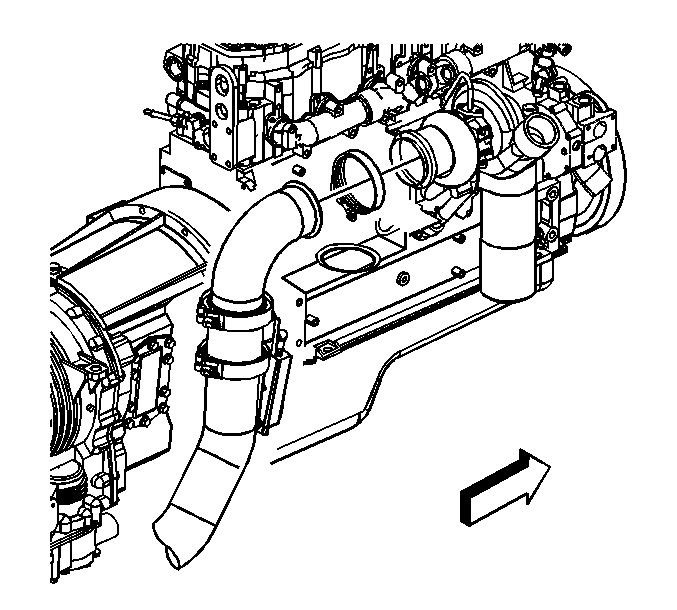
- Remove
the exhaust pipe from the turbocharger. Refer to
Exhaust Manifold Pipe Replacement
in Engine Exhaust.
- Remove the exhaust pipe from the muffler. Refer to
Muffler Replacement
in Engine Exhaust.
- If equipped, remove the transmission support. Refer to
Transmission Support Replacement
in Manual Transmission -
Medium Duty.
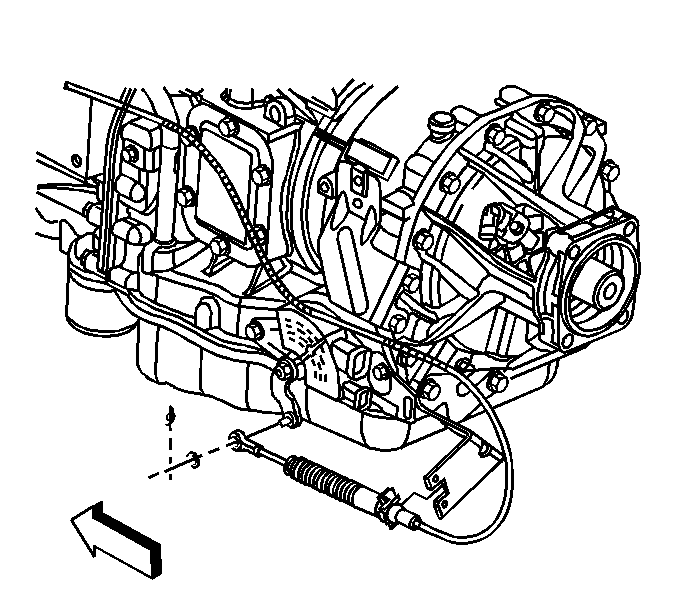
- If
equipped with an automatic transmission, perform steps 22-34.
- Drain the transmission oil. Refer to
Automatic Transmission Fluid and Filter Replacement
in Automatic Transmission -
Allison.
- Remove the transmission oil level indicator and the oil level indicator
tube. Refer to
Transmission Fluid Filler Tube and Seal Replacement
in
Automatic Transmission - Allison.
- If equipped, remove the transmission heat shield fasteners and the heat
shield from the transmission.
- Remove the starter. Refer to
Starter Motor Replacement
in Engine Electrical.
- If equipped, remove the oil cooler lines from the transmission. Refer
to
Transmission Fluid Auxiliary Cooler Line Replacement
in Automatic Transmission - Allison.
- If equipped, remove the shift cable from the transmission.
- Remove the wiring harness and disconnect the transmission electrical connectors
- If equipped, remove the flywheel housing access cover.
- Mark the flywheel and torque converter or the flex plate relationship
for reassembly purposes.
- Turn the flex plate using a pry bar or the engine harmonic balancer, in
order to align the torque converter or flex plate bolts with the access hole or starter
hole.
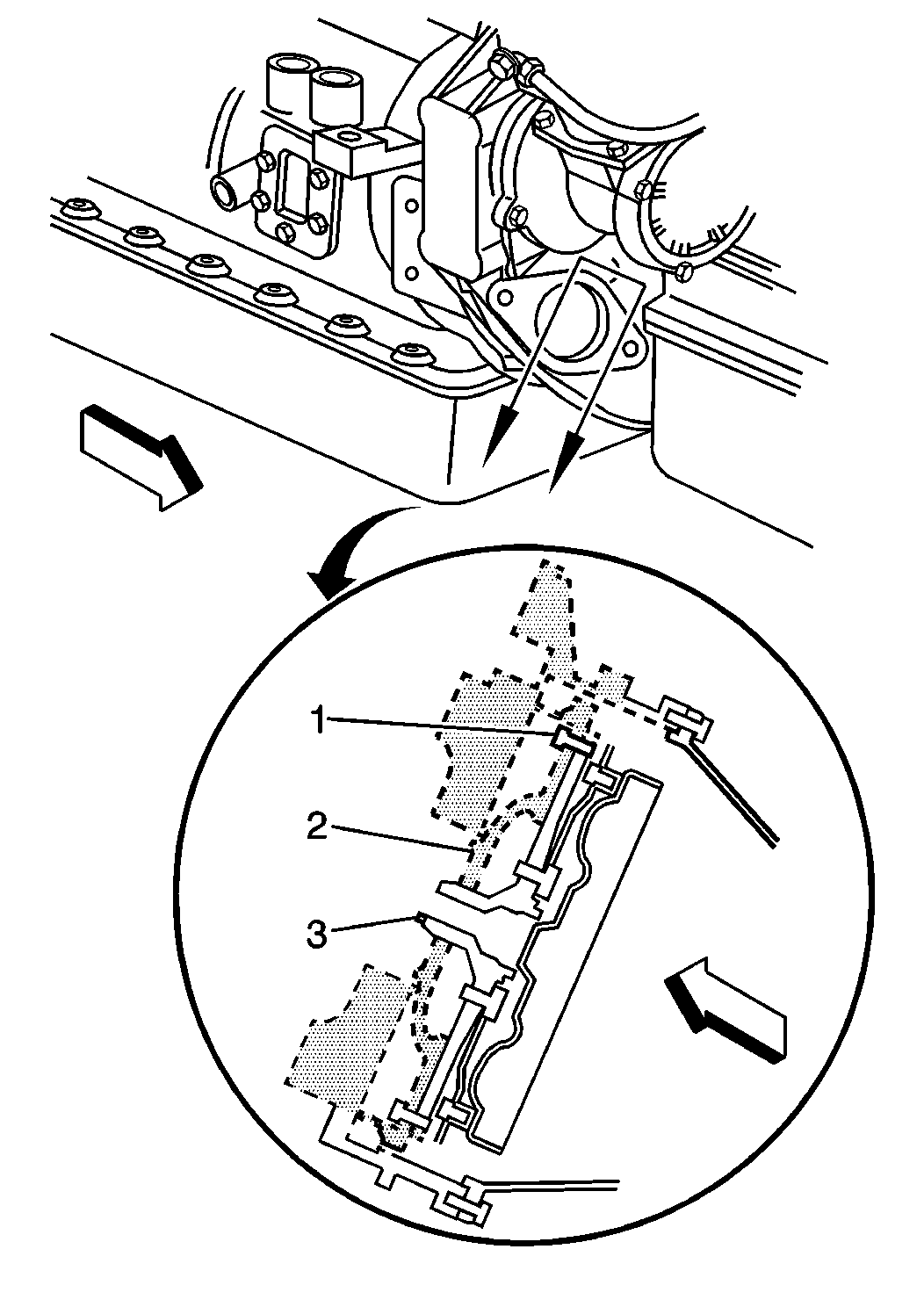
- Remove the flex plate (3) to flywheel (2)
bolts (1) or if equipped, the torque converter bolts.
- If equipped, remove the fuel line from the fuel line bracket.
- If equipped, remove the fuel line retainer bracket from the transmission.
- If equipped with a manual transmission, perform steps 36-41.
- Remove all electrical connectors from the transmission.
- Remove all electrical harness retainers from the transmission.
- If required, raise the vehicle. Refer to
Lifting and Jacking the Vehicle
in General Information.
- Remove the clutch cable and bracket from the transmission. Refer to
Clutch Cable Return Spring and/or Bracket Replacement
in
Clutch.
- Remove the control lever and boot. Refer to
Control Lever and/or Boot Replacement
in Manual Transmission -
Medium Duty.
- If equipped, remove the fuel line retainers from the transmission.
- Using a transmission jack, support the rear of the transmission.
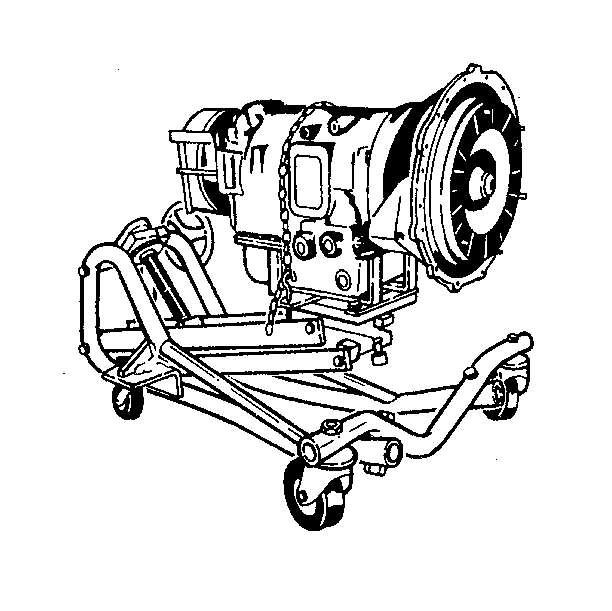
Important: Support the transmission with a transmission
jack that can support a load of at least 349 kg (750 lb).
- Install a safety chain to secure the transmission to the transmission jack.
- Using a suitable overhead hoist, attach a load leveling devise to the
front engine lifting eye.
- Remove the rear engine mounting bolts. Refer to
Engine Rear Mount Bracket Replacement
.
- Remove the front engine mounting bolts. Refer to
Engine Front Mount Bracket Replacement
.
- Ensure the wiring harness does not become hung up on the engine.
- Pull the engine forward far enough to connect to the rear engine lift
eye.
- Attach the load leveling device to the rear engine lift eye.
- Remove the transmission jack.
- Remove the engine and transmission from the vehicle.
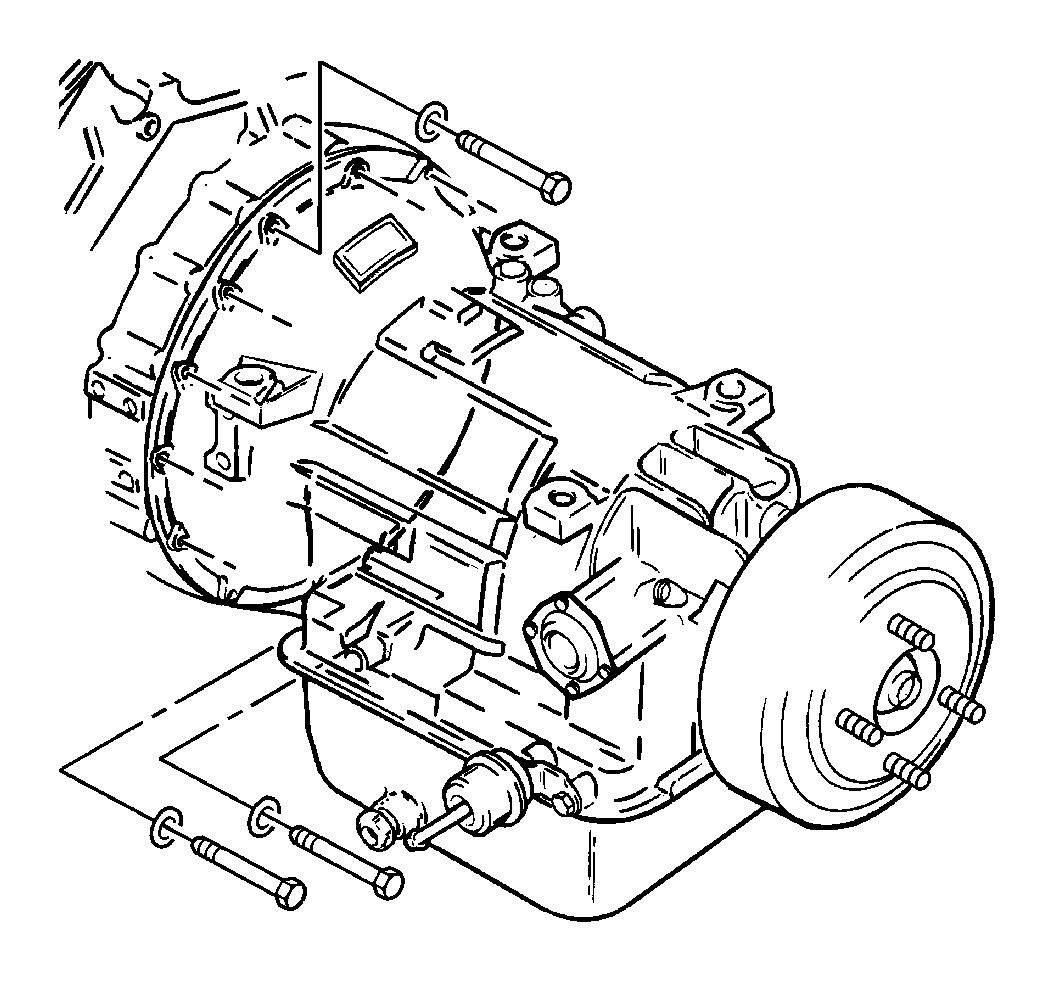
- If equipped with an automatic transmission,
perform the following:
| 53.1. | Attach the transmission jack. |
| 53.2. | Remove the bolts securing the transmission to the engine. |
| 53.3. | Remove the transmission from the engine by sliding the transmission rearward. |
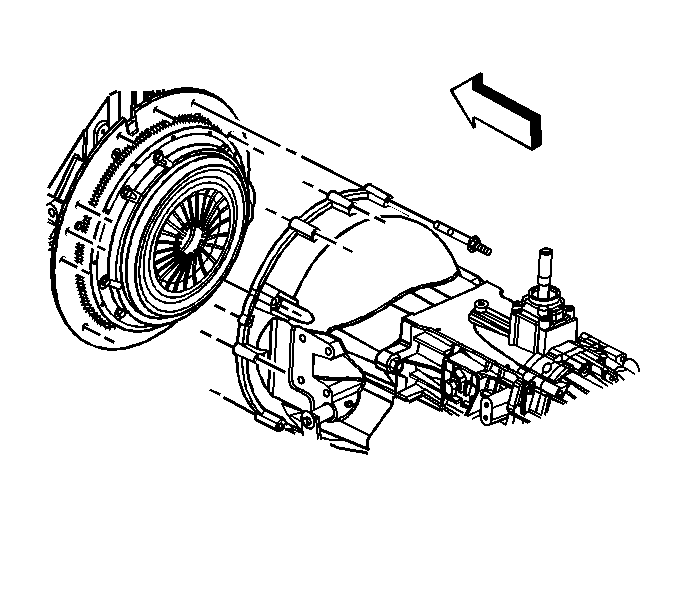
- If
equipped with a manual transmission perform the following:
| 54.1. | Attach the transmission jack. |
| 54.2. | Remove the transmission apron housing bolts. |
| 54.3. | Move the transmission straight back from the engine, keep the mainshaft in alignment
with the clutch disc hub. |
| 54.4. | When the transmission is free from the engine, lower and remove the transmission. |
Installation Procedure
- If equipped with a manual transmission, perform steps 2-9.
- Shift the transmission into high gear.
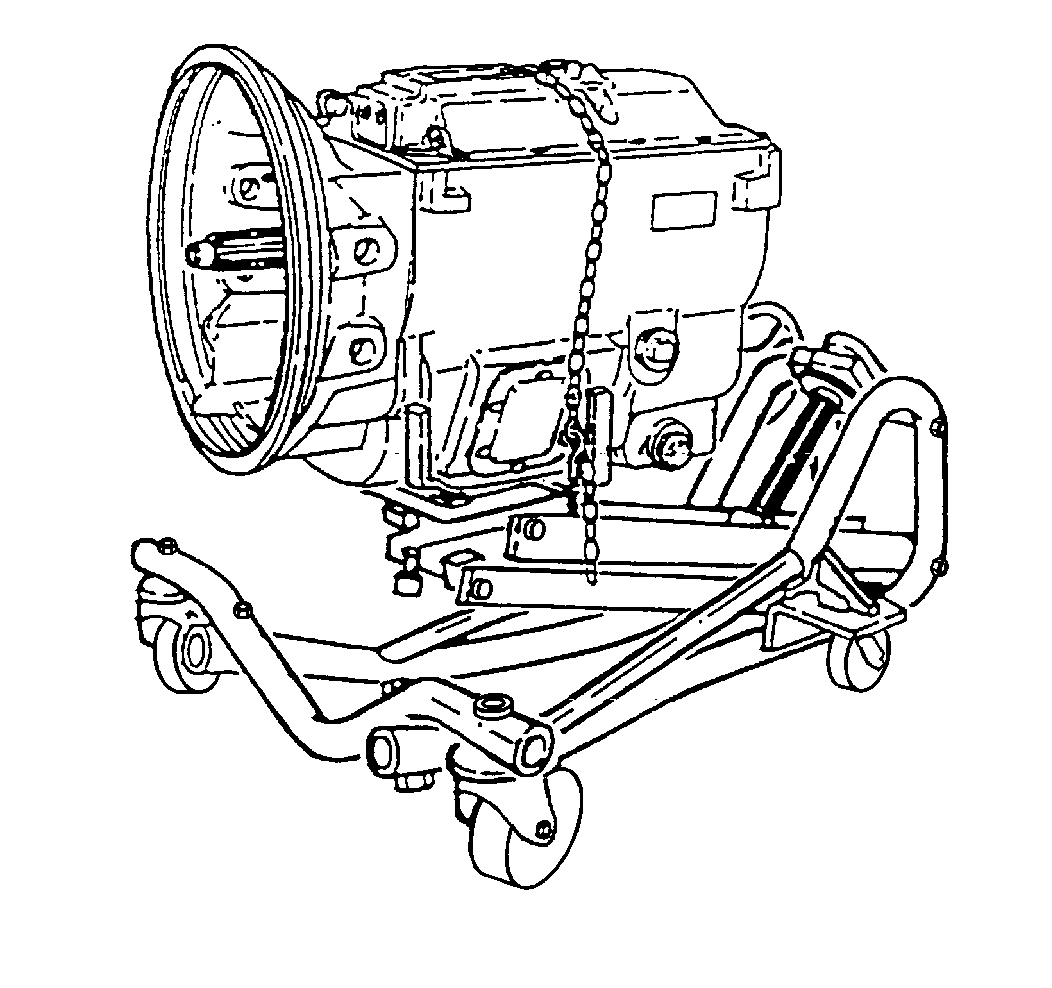
- With the transmission mounted to a suitable
dolly, move the transmission into position under the vehicle.
- Rotate the output shaft to align the main drive gear shaft with the clutch
disc hub.

- Move
the transmission forward, guiding the main drive gear shaft into the clutch disc hub.
- Install the transmission.
| • | Avoid springing the clutch when installing the transmission. |
| • | Do not allow the transmission to drop or hang unsupported in the splined
hub of the clutch disc. |
Notice: Refer to Fastener Notice in the Preface section.
- Install the transmission apron housing bolts.
Tighten
Tighten the transmission apron housing bolts to
50 N·m (37 lb ft).
- If equipped, install the exhaust manifold front pipe bracket and transmission
bolts.
- Remove the transmission jack.

- If equipped with an automatic transmission,
perform steps 11-15.
- Reattach the transmission jack.
- Raise the transmission to the engine.
- Install the transmission to the engine while aligning the torque converter
with the engine flex plate.
- Install the transmission to engine bolts.
Tighten
Tighten the transmission to engine bolts to 50 N·m
(37 lb ft).
- Remove the transmission jack.
- Position the engine and transmission into the vehicle as far as possible.

- Install the transmission jack.
Important: Support the transmission with a transmission
jack that can support a load of at least 349 kg (750 lb).
- Install a safety chain to secure the transmission to the transmission jack.
- Remove the leveling device from the rear engine lift eye only.
- Install the engine and transmission to the engine mounts.
- Install the front engine mount bolts. Refer to
Engine Front Mount Bracket Replacement
.
- Install the rear transmission mount bolts. Refer to
Engine Rear Mount Bracket Replacement
.
- If equipped, install the transmission rear support. Refer to
Transmission Support Replacement
in Manual Transmission -
Medium Duty.
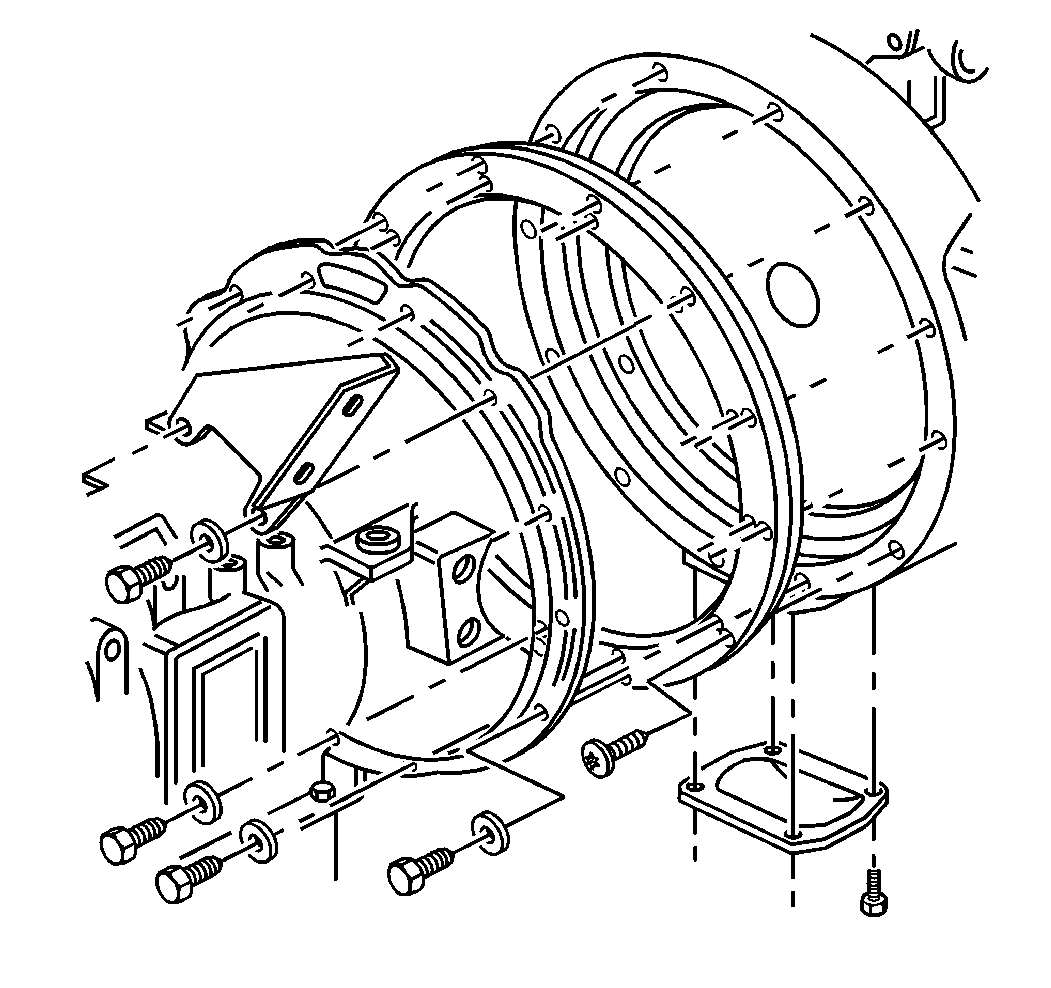
- If equipped with an automatic transmission,
perform steps 25-28.
- Turn the engine flex plate using a pry bar or engine at the harmonic balancer
in order to install the torque converter to the flywheel bolts.
- When reusing the torque converter bolts, clean the bolts and apply Loctite.
- Install the torque converter bolts.
Tighten
Tighten the torque converter to flywheel bolts to
60 N·m (44 lb ft).
- If equipped, install the flywheel housing access cover.
- Remove the overhead hoist.
- Remove the transmission jack.
- Install the starter assembly. Refer to
Starter Motor Replacement
in Engine Electrical.

- Install
the muffler to the exhaust pipe. Refer to
Muffler Replacement
in Engine Exhaust.
- Install the exhaust from the muffler to the turbocharger. Refer to
Exhaust Manifold Pipe Replacement
in Engine Exhaust.

- If equipped, install the parking brake cable
to the park brake drum.
- If equipped, install the oil cooler lines to the transmission. Refer to
Transmission Fluid Auxiliary Cooler Line Replacement
in
Automatic Transmission - Allison.
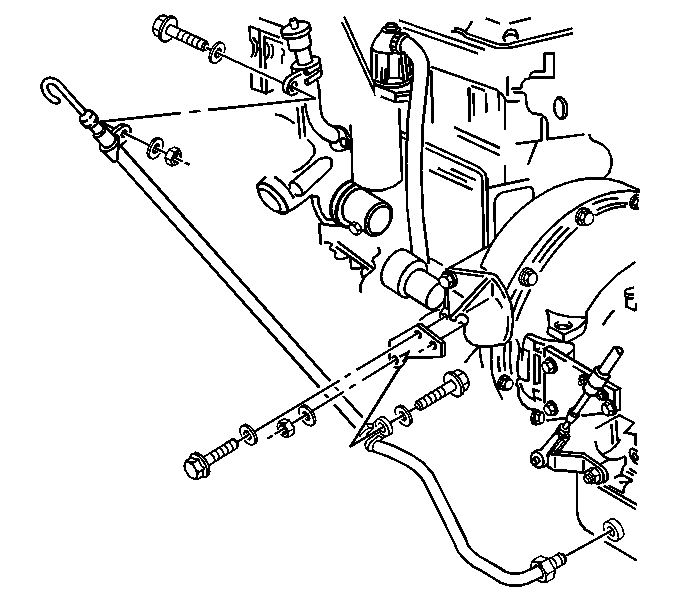
- Install the oil level indicator tube. Refer to
Transmission Fluid Filler Tube and Seal Replacement
in Automatic Transmission - Allison.
- Connect the transmission electrical connectors and install the wiring
harness to the transmission.
- If equipped, install the fuel line brackets.
- If equipped, install the fuel lines to the fuel line brackets.
- If equipped, install the transmission heat shield with 2 bolts.
Tighten
Tighten the transmission heat shield bolts to 15 N·m
(11 lb ft).
- Install the propeller shaft to the transmission. Refer to
One-Piece Propeller Shaft Replacement
,
Two-Piece Propeller Shaft Replacement
or to
Three-Piece Propeller Shaft Replacement
in Propeller
Shaft.

- If
equipped, install the shift cable to the transmission.
- Lower the vehicle, if required.
- Install the front engine crossmember. Refer to
Engine Front Crossmember Replacement
in Frame and Underbody.
- Install the radiator crossmember. Refer to
Radiator Crossmember Replacement
in Frame and Underbody.
- Install the air compressor and the lines.
- Install the fuel lines and connectors to the fuel supply pump.
- Install the ground straps to the frame and the engine.
- Install the following engine electrical harness connectors to the appropriate
connectors.
| • | The oil pressure sensor |
| • | The generator electrical connectors |
| • | If equipped, the A/C clutch and high pressure switch electrical connectors |
| • | The coolant temperature sensor |
| • | The glow plug electrical connectors |
| • | The oil level electrical connectors |
| • | The fuel filter electrical connectors |
- Install the engine electrical harness to the retainers and the brackets.
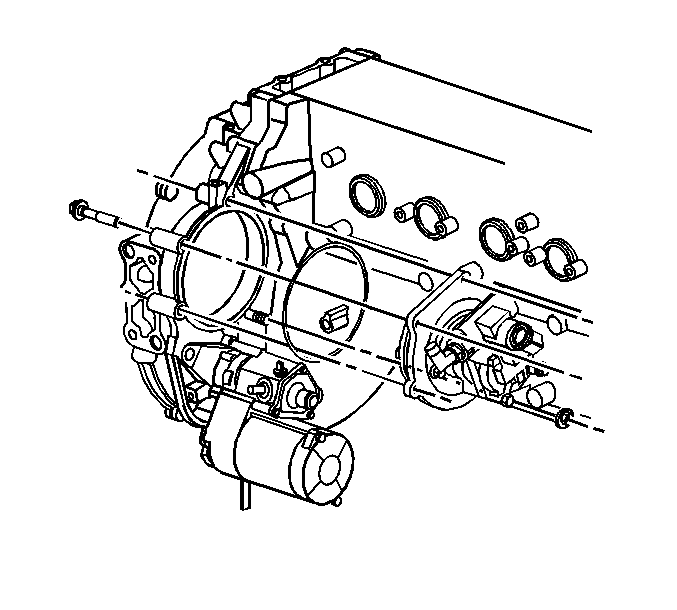
- Install the power steering pump.
- Install the fuel lines and connectors to the fuel supply pump and at the
back of the engine.
- Install the heater hoses to the engine.
- Install the air inlet pipes.
- Install the cooling layer. Refer to
Cooling Layer Removal
in Engine Cooling.
- Install the air cleaner layer. Refer to
Air Cleaner Replacement
in Engine Controls - 7.8L.
- Install the engine cover. Refer to
Engine Cover Replacement
in Interior Trim.
- Connect the battery negative cable. Refer to
Battery Negative Cable Disconnection and Connection
in Engine Electrical.
- Remove the wheel blocks.
Important: Inspect all fluid levels before starting
the engine.
- Fill the engine cooling system with the proper type and quantity of coolant.
- Fill the engine crank case with the proper grade and quantity of oil.
- If equipped with air brakes, fill the air brake reservoirs with air. Refer
to
Filling Reservoirs
in Air Brakes.



















